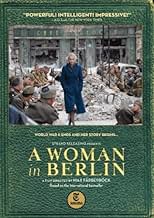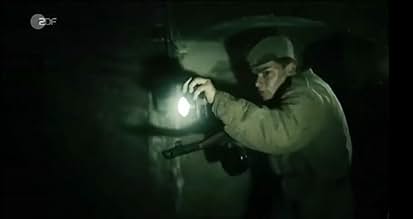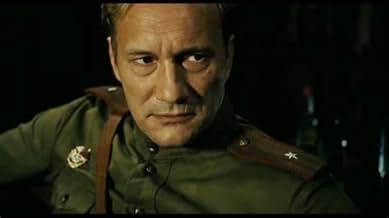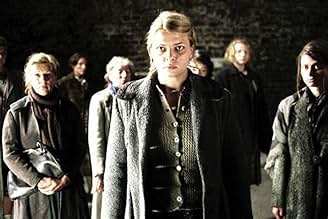NOTE IMDb
7,0/10
7,2 k
MA NOTE
Ajouter une intrigue dans votre langueA woman tries to survive the invasion of Berlin by the Soviet troops during the last days of World War II.A woman tries to survive the invasion of Berlin by the Soviet troops during the last days of World War II.A woman tries to survive the invasion of Berlin by the Soviet troops during the last days of World War II.
- Réalisation
- Scénario
- Casting principal
- Récompenses
- 1 victoire et 4 nominations au total
Evgeniy Sidikhin
- Major Andreij Rybkin
- (as Evgeny Sidikhin)
Viktor Zhalsanov
- asiatischer Rotarmist
- (as Victor Zhalsanov)
Avis à la une
10hasosch
Max Färberböck, known to the world-wide audience since his "Aimee and Jaguar", shows in this newer film for once not the standard story of the bad Germans, who, deserving after what they have done, being Nazis, are liberated by the good Russians, the good Americans and the good Allies. It shows exactly the same experience that we all, who grew up in the East Block, had about our Russiand "friends". They came to rape, to destroy, to violate, to erase. It is a very interesting fact concerning mass psychology or perhaps better mass-psychosis that nobody normally speaks about the enormous amount of destruction done or caused by the liberators of end-World War II Europe. And nobody even mentions the Stalinist concentration camps. This is why we need films like "Eine Frau In Berlin".
However, in Färberböcks film, we see the Russians, "like animals, like pigs, an-alphabets, without culture" - as the Russian Major says it in his own words, he, who speaks, according to the main female character "a seldomly high-style Russian". Well, a little bit of "justness" had to be - not ALL Russians are like the "scum" (quotation from the movie) that we see. Interestingly, my Hungarian home-town had been bombed by Americans, but afterward the Russians came like vultures and pitched themselves into the ruins, what was female, was raped, what had been church or synagogue - was emptied and the treasures stolen, a subculture sneaking from the sou-terrain up to the ruins and even profiting from corpses and debris.
However, in Färberböcks film, we see the Russians, "like animals, like pigs, an-alphabets, without culture" - as the Russian Major says it in his own words, he, who speaks, according to the main female character "a seldomly high-style Russian". Well, a little bit of "justness" had to be - not ALL Russians are like the "scum" (quotation from the movie) that we see. Interestingly, my Hungarian home-town had been bombed by Americans, but afterward the Russians came like vultures and pitched themselves into the ruins, what was female, was raped, what had been church or synagogue - was emptied and the treasures stolen, a subculture sneaking from the sou-terrain up to the ruins and even profiting from corpses and debris.
A Woman in Berlin (2008)
Imagine the horrors of women caught in a large city during the chaos of war, with occupying troops storming your apartment building day after day. Well, think again. It isn't imaginable. I think even people who live through such things (and we are talking Berlin, 1945 for this movie) the truth is something that is pushed away. Because even watching a movie--a movie!--of these events is unbearable.
Not that the movie is unwatchable. Just the opposite. It's beautifully made, seeming to parallel that other recent German movie about the last days of the Nazi reign, "Downfall," 2004. But unlike that movie, this isn't about political history, or the history of war, or even the dramatization of historical figures as real people. This is a personal story, centering around one woman played by Nina Hoss, and about the repeated rape and abuse of women by the Russian troops for days and weeks on end. There was no escape, no power to complain to, no justice anywhere, anywhere, not German or Russian or even American (assuming they were any better) a mile or two away.
The movie is based on a book, "Anonyma," by a woman whose identity is not revealed, if it is even known (this was her protection even after death). The movie suffers now and then from a sameness, a steady pounding, beginning to end. The parade of horrors is continuous even as relationships develop and the first wave of anarchistic occupiers shifts to more entrenched troops and some general partying. You do cling to some semblance of progression, or of events to stand out from the others, but it's mostly about horribleness.
But maybe that's the way it should be. It was an endless nightmare on every level, even if you (they, these women) survive. In some ways, the end of the war is more believably insane here than in "Downfall" even though they are in many ways comparable movies, comparable moments. Such an array or gritty, believable acting and sets you won't find often. And thankfully, even the sentimental aspects are handled without swelling music and other cinematic tricks found too often this side of the Atlantic.
One last point, whatever you think of the Germans and WWII, here is yet another kind of national acknowledgment and, for many, soul-searching. This is a German film. The Russians don't come off great, for sure, but the Germans are clearly at fault, and are shown that way, and shown as responsible for even greater crimes. There's no glossing over any of it. Watch this movie. It won't be fun, but it'll be stirring and important.
Imagine the horrors of women caught in a large city during the chaos of war, with occupying troops storming your apartment building day after day. Well, think again. It isn't imaginable. I think even people who live through such things (and we are talking Berlin, 1945 for this movie) the truth is something that is pushed away. Because even watching a movie--a movie!--of these events is unbearable.
Not that the movie is unwatchable. Just the opposite. It's beautifully made, seeming to parallel that other recent German movie about the last days of the Nazi reign, "Downfall," 2004. But unlike that movie, this isn't about political history, or the history of war, or even the dramatization of historical figures as real people. This is a personal story, centering around one woman played by Nina Hoss, and about the repeated rape and abuse of women by the Russian troops for days and weeks on end. There was no escape, no power to complain to, no justice anywhere, anywhere, not German or Russian or even American (assuming they were any better) a mile or two away.
The movie is based on a book, "Anonyma," by a woman whose identity is not revealed, if it is even known (this was her protection even after death). The movie suffers now and then from a sameness, a steady pounding, beginning to end. The parade of horrors is continuous even as relationships develop and the first wave of anarchistic occupiers shifts to more entrenched troops and some general partying. You do cling to some semblance of progression, or of events to stand out from the others, but it's mostly about horribleness.
But maybe that's the way it should be. It was an endless nightmare on every level, even if you (they, these women) survive. In some ways, the end of the war is more believably insane here than in "Downfall" even though they are in many ways comparable movies, comparable moments. Such an array or gritty, believable acting and sets you won't find often. And thankfully, even the sentimental aspects are handled without swelling music and other cinematic tricks found too often this side of the Atlantic.
One last point, whatever you think of the Germans and WWII, here is yet another kind of national acknowledgment and, for many, soul-searching. This is a German film. The Russians don't come off great, for sure, but the Germans are clearly at fault, and are shown that way, and shown as responsible for even greater crimes. There's no glossing over any of it. Watch this movie. It won't be fun, but it'll be stirring and important.
To begin with the end note: When the anonymous memoir adapted here ('Anonyma - Eine Frau in Berlin') was published in Switzerland in 1959, it was greeted with such outrage among Germans the author allowed no further editions; she of course never revealed her name. Here we are, fifty years later, and the material is still incendiary and hard to get your head around. It concerns events that are unspeakable and incomprehensible.
As played by the strikingly handsome, elegant Nina Hoss, "Anonyma" is an ash blond who can wear odds and ends as if they were couturier fashions, a journalist fluent in French and Russian, at home in Paris and London, who comes back from assignment to be in the Führer's capital for the final victory she still believes in. The Third Reich for her and her pals seems a time of freshness and energy for Germany. The war is just a blip on the horizon soon to be done with. She parties with fellow supporters of the Fatherland's great endeavor who toast the troops and boast that the buffoonish Russians will fall by the wayside. They don't, and when they invade Berlin and begin the wholesale raping of the German women, she chooses to mete out her favors selectively for her own protection and that of her neighbors in the apartment building. This is the story of how that happens.
When Berlin crumbles apartment dwellers are hiding in the basement, like ghosts; then, like condemned men and women given an uneasy reprieve, they return to living in the remnants of apartments. "Anonyma" moves in with a group of others in a large flat and turns over the studio she occupied with her absent soldier boyfriend Gerd (August Diehl), for whom she keeps a diary of what happens, to an unrepentantly Nazi young woman and the adolescent German soldier boyfriend she hides (Sebastian Urzendowsky), who is armed. This unwise gesture is the pistol we know will go off eventually, endangering everybody.
The film shows only two public events: the invasion, and the official German declaration that the Germans have surrendered Berlin. The period in between is the main focus of the diary and the film. It's not specified but it was about three months.
The film focuses on a handful of neighbors, who include ; two lively sisters (Joerdis Triebel, Rosalie Thomass), a strong-willed widow (Irm Hermann); an elderly bookseller (Katharina Blaschke); a liquor dealer (Maria Hartmann); a pair of lesbian lovers (Sandra Hueller, Isabell Gerschke); a refugee girl in hiding (Anne Kanis) and a stolid octogenarian (Erni Mangold). And there are more, not to mention a half dozen clearly defined Russians, including the high ranking officer's Mongolian guard.
It's a bit difficult to keep track of all these, and Woman in Berlin is best at making us feel close to the narrator and conveying a sense of the chaos and uncertainty when the invasion and the raping begin. There seems to be no control. It's hard to see that anything is going on. The Russians are just there, wandering free, and brutalizing the German women. When these women meet the question they ask each other is not whether but "How often?" Anonyma sleeps with various Russians, willingly and not. Protesting the violations and seeking a protective officer she first becomes involved with Anatol (Roman Gribkov), a pretty, frivolous man who turns out to be not a career soldier but a dairyman. He comes and goes and is no real help. She calls him "a gypsy." Then she finds a battalion commander, Major Rybkin (the excellent, charismatic Yevgeni Sidikhin), who is unresponsive when she confronts him boldly in front of a lot of Russian soldiers, and then comes around to find her. Unlike the Germans, she says later in her diary (which we see her constantly scribbling in pencil), the Russians appreciate an educated woman.
A strength of the film is that it alternates naturally between noise and violence, drunken celebration when Russians and Germans fraternize in the big apartment, and "love," which has lost its usual meaning, but lingers on. These extremes never seem overwrought or manipulative. Here's a time when in a film the fact that nothing makes sense, makes sense. The protagonist recognizes that in the eyes of many she is now a whore, but she questions what a whore is.
Marguerite Duras' screenplay for 'Hiroshima Mon Amour' is poetic and overwrought, ut in its rhythmic repetitions it strongly conveys a sense of the aftermath of trauma isn't found in the somewhat overlong 'Woman in Berlin,' which is simply about the confusion of day-to-survival in a world where morality is turned on its head. As Anonyma knew however and as we see in the film, the defeated must capitulate or die, and the invaders have suffered horribly too. One young soldier reconts in Russian, demanding that she translate to all present, how invading Germans brutally slaughtered all the children in his village while he watched. Even Andreij's wife has been killed by the Germans. And the film shows the range of the then Russian people, the Ukrainians, Caucasians, Mongols, who are to be the Soviet Union.
Though reviewers and commentators seem to think they know what all this material means and proclaim judgments if not on the protagonist, on the filmmaker, this is primarily an example of Germans taking hard looks at repressed material that formerly was too ugly to examine. This isn't an impassioned indictment or defense, but a movie that uses an extraordinary diary (only published in Germany in 2003) to present an admirably complex picture of a crazy time. If it is both remarkable in its focus and at times quite old fashioned in its methods, that's as good a way as any to get things across. The result is both specific and wide-reaching, because there's ample time to ponder a basic issue for civilians in wartime: what does it cost you to survive?
As played by the strikingly handsome, elegant Nina Hoss, "Anonyma" is an ash blond who can wear odds and ends as if they were couturier fashions, a journalist fluent in French and Russian, at home in Paris and London, who comes back from assignment to be in the Führer's capital for the final victory she still believes in. The Third Reich for her and her pals seems a time of freshness and energy for Germany. The war is just a blip on the horizon soon to be done with. She parties with fellow supporters of the Fatherland's great endeavor who toast the troops and boast that the buffoonish Russians will fall by the wayside. They don't, and when they invade Berlin and begin the wholesale raping of the German women, she chooses to mete out her favors selectively for her own protection and that of her neighbors in the apartment building. This is the story of how that happens.
When Berlin crumbles apartment dwellers are hiding in the basement, like ghosts; then, like condemned men and women given an uneasy reprieve, they return to living in the remnants of apartments. "Anonyma" moves in with a group of others in a large flat and turns over the studio she occupied with her absent soldier boyfriend Gerd (August Diehl), for whom she keeps a diary of what happens, to an unrepentantly Nazi young woman and the adolescent German soldier boyfriend she hides (Sebastian Urzendowsky), who is armed. This unwise gesture is the pistol we know will go off eventually, endangering everybody.
The film shows only two public events: the invasion, and the official German declaration that the Germans have surrendered Berlin. The period in between is the main focus of the diary and the film. It's not specified but it was about three months.
The film focuses on a handful of neighbors, who include ; two lively sisters (Joerdis Triebel, Rosalie Thomass), a strong-willed widow (Irm Hermann); an elderly bookseller (Katharina Blaschke); a liquor dealer (Maria Hartmann); a pair of lesbian lovers (Sandra Hueller, Isabell Gerschke); a refugee girl in hiding (Anne Kanis) and a stolid octogenarian (Erni Mangold). And there are more, not to mention a half dozen clearly defined Russians, including the high ranking officer's Mongolian guard.
It's a bit difficult to keep track of all these, and Woman in Berlin is best at making us feel close to the narrator and conveying a sense of the chaos and uncertainty when the invasion and the raping begin. There seems to be no control. It's hard to see that anything is going on. The Russians are just there, wandering free, and brutalizing the German women. When these women meet the question they ask each other is not whether but "How often?" Anonyma sleeps with various Russians, willingly and not. Protesting the violations and seeking a protective officer she first becomes involved with Anatol (Roman Gribkov), a pretty, frivolous man who turns out to be not a career soldier but a dairyman. He comes and goes and is no real help. She calls him "a gypsy." Then she finds a battalion commander, Major Rybkin (the excellent, charismatic Yevgeni Sidikhin), who is unresponsive when she confronts him boldly in front of a lot of Russian soldiers, and then comes around to find her. Unlike the Germans, she says later in her diary (which we see her constantly scribbling in pencil), the Russians appreciate an educated woman.
A strength of the film is that it alternates naturally between noise and violence, drunken celebration when Russians and Germans fraternize in the big apartment, and "love," which has lost its usual meaning, but lingers on. These extremes never seem overwrought or manipulative. Here's a time when in a film the fact that nothing makes sense, makes sense. The protagonist recognizes that in the eyes of many she is now a whore, but she questions what a whore is.
Marguerite Duras' screenplay for 'Hiroshima Mon Amour' is poetic and overwrought, ut in its rhythmic repetitions it strongly conveys a sense of the aftermath of trauma isn't found in the somewhat overlong 'Woman in Berlin,' which is simply about the confusion of day-to-survival in a world where morality is turned on its head. As Anonyma knew however and as we see in the film, the defeated must capitulate or die, and the invaders have suffered horribly too. One young soldier reconts in Russian, demanding that she translate to all present, how invading Germans brutally slaughtered all the children in his village while he watched. Even Andreij's wife has been killed by the Germans. And the film shows the range of the then Russian people, the Ukrainians, Caucasians, Mongols, who are to be the Soviet Union.
Though reviewers and commentators seem to think they know what all this material means and proclaim judgments if not on the protagonist, on the filmmaker, this is primarily an example of Germans taking hard looks at repressed material that formerly was too ugly to examine. This isn't an impassioned indictment or defense, but a movie that uses an extraordinary diary (only published in Germany in 2003) to present an admirably complex picture of a crazy time. If it is both remarkable in its focus and at times quite old fashioned in its methods, that's as good a way as any to get things across. The result is both specific and wide-reaching, because there's ample time to ponder a basic issue for civilians in wartime: what does it cost you to survive?
Although I was aware of the awesomeness of German cinema in the past decades, I was still pleasantly surprised by this film. The title of the movie implies a specific point of view - the plight of a woman trapped in Berlin during the last days of WW2. The movie is however far less black-and-white (metaphorically speaking, of course) than it could have been. It goes beyond a simplistic right/wrong attitude and instead puts the audience in a position to ponder how in a war atrocities escalate and feed on themselves in a typical "chicken and egg" problem. Even the fact that the book on which the movie is based was met with outrage when it was first published in the 50's is ultimately part of this chain.
There are more complex answers to why horrible things happen in a war, and in the world in general - and Europe has had its share of it - and this film manages to capture these complexities masterfully.
There are more complex answers to why horrible things happen in a war, and in the world in general - and Europe has had its share of it - and this film manages to capture these complexities masterfully.
rape is the particular plight of women during war and acknowledged at long last as a war crime.The plight of German women at the end of WW II was especially awful as they had protection from no one. General Eisenhower who punished rape committed by his men with execution outside of Germany (first rape took place six hours after invasion of Normandy had begun)but as for German women all men had free hands as these women were all declared "willing". The Americans are the only ones to have gone through archives as for army rape in WW II however the one recent book existing is not allowed for publishing in the US because of the war in Iraq (!!)so exists in French version only. The French and the British have preferred to turn a blind eye to what was done by their soldiers towards German women let alone the Russians. It is very important that this film has been made at long last. Subject concerns all not just its victims let alone the children born out of the horrors. Bravo Germany.
Le saviez-vous
- AnecdotesThe source novel was virtually banned in West Germany when it was first published in the late 1950s. When it was republished in 2003, it became a huge bestseller and nationwide sensation in a reunified Germany.
- GaffesWhen Germany's surrender is announced, the Soviet troops start singing the "Alexandrov version" of their national anthem, adopted about a year earlier. That version had no lyrics until Stalin intervened, and the heavy fighting wouldn't have allowed the soldiers to learn them. They most likely sang the chorus of "The Internationale," an earlier, better-known version.
- ConnexionsFeatured in History: Anonyma - Die Frauen von Berlin (2010)
Meilleurs choix
Connectez-vous pour évaluer et suivre la liste de favoris afin de recevoir des recommandations personnalisées
- How long is A Woman in Berlin?Alimenté par Alexa
Détails
- Date de sortie
- Pays d’origine
- Site officiel
- Langues
- Aussi connu sous le nom de
- Anónima - Una mujer en Berlín
- Lieux de tournage
- Sociétés de production
- Voir plus de crédits d'entreprise sur IMDbPro
Box-office
- Montant brut aux États-Unis et au Canada
- 294 014 $US
- Week-end de sortie aux États-Unis et au Canada
- 12 439 $US
- 19 juil. 2009
- Montant brut mondial
- 1 863 939 $US
- Durée2 heures 11 minutes
- Couleur
- Mixage
- Rapport de forme
- 2.35 : 1
Contribuer à cette page
Suggérer une modification ou ajouter du contenu manquant

Lacune principale
By what name was Anonyma - Eine Frau in Berlin (2008) officially released in India in English?
Répondre


































